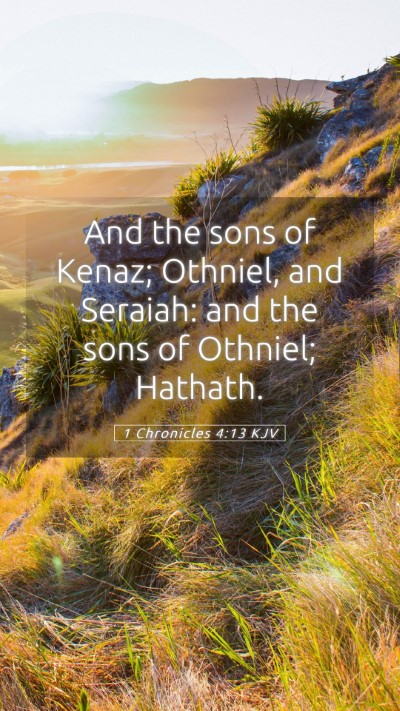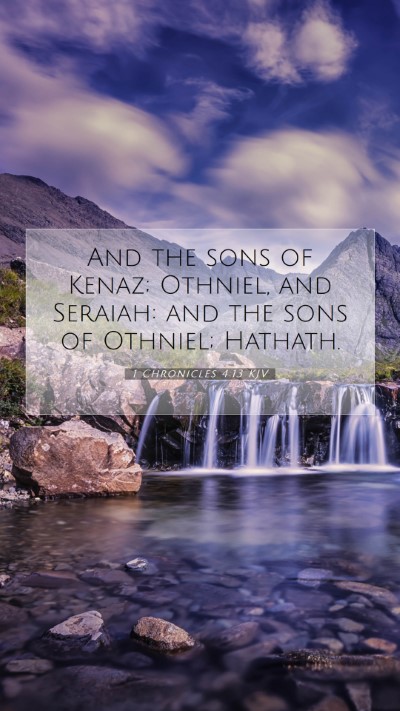Understanding 1 Chronicles 4:13
Bible Verse: 1 Chronicles 4:13 – "And the sons of Kenaz; Othniel, and Seraiah: and the sons of Othniel; Hathath." (KJV)
This verse is part of a genealogical record in the Book of 1 Chronicles. It is important to approach this verse with a focus on its historical and theological context, recognizing its role in showing the lineage and significant personalities within Israel’s history.
General Overview
1 Chronicles 4:13 mentions the descendants of Kenaz, particularly Othniel, the first judge of Israel, who is noted for his courage and leadership. This reference highlights the importance of familial lineage, as genealogy plays a significant role in the Old Testament context. The inclusion of these names serves to connect the past with Israel's divine purpose and heritage.
Bible Verse Meanings
The meaning of Bible verses in genealogies, such as this one, often lies in the connections they provide to key figures in biblical history. Scholars such as Matthew Henry and Adam Clarke have noted that genealogies serve not just to record names but to affirm God’s providence in preserving a people through whom He would accomplish His redemptive purposes.
Bible Verse Interpretations
Albert Barnes indicates that the mention of Othniel and his lineage represents a continuation of God’s work through specific individuals. Each name adds depth to the narrative of Israel's history, showing how God uses families and clans to fulfill His promises. Othniel, as the first judge, is significant not only for his role but also for what he represents in terms of God raising leaders to guide His people.
Bible Verse Understanding
Understanding this scripture requires recognizing the historical context of the Israelite tribes and their leaders. The genealogies in the Old Testament serve as a testament to God's faithfulness across generations. They are vital for establishing the legitimacy of David's lineage and the Messianic line, which is crucial for New Testament interpretations.
Bible Verse Explanations
This verse serves as a reminder that God oversees history through specific individuals and families. The focus is not merely on names but on the divine purpose behind them. Othniel's significance extends beyond this genealogical record; he became a model of justice and leadership in Israelite culture, symbolizing divine appointment. When studying scripture, one must consider how such passages relate to God’s overarching plan and the continuity of His covenant with His people.
Cross References
This verse can be related to:
- Judges 1:13: This passage talks about Othniel's victory and leadership.
- Joshua 15:17: It describes the inheritance connected to Othniel.
- Hebrews 11:32: Othniel is commended in the hall of faith.
Conclusion
1 Chronicles 4:13 serves a critical purpose within the narrative of Scripture, illustrating the importance of genealogies in understanding God's continuum of grace and leadership in Israel. For those engaging in online Bible study, this verse allows for reflection on the importance of recognizing God's work in and through individuals throughout history.
Bible Study Insights
Using this passage for Bible study allows groups and individuals to delve into the significance of godly legacy and leadership. It affirms the understanding that God calls and raises leaders from among the people to guide them according to His purposes. As you engage with such verses, consider the following:
- What does this verse reveal about God's sovereignty?
- How do the names mentioned reflect God’s work in history?
- What applications can be made regarding leadership in today's context?
Application of 1 Chronicles 4:13
This verse encourages believers to recognize the importance of their spiritual heritage and the potential impact of each individual’s life on future generations. Each leader mentioned in Scripture offers lessons in faithfulness and the pursuit of God’s purposes, providing a rich ground for applications in daily life.


